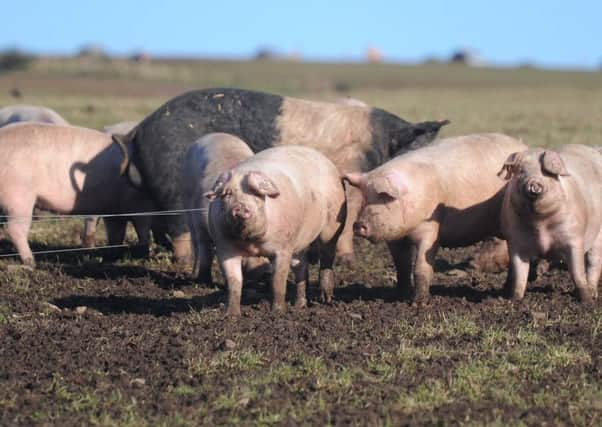Pigmeat prices on the rise despite soaring feed costs
This article contains affiliate links. We may earn a small commission on items purchased through this article, but that does not affect our editorial judgement.


The reversal of the slide experienced over the first eight weeks of the year saw prices climb to 151p a kg in March – close to 35 per cent up on the previous year, according to QMS senior economic analyst Iain Macdonald.
“While this impressive year-on-year increase will be of comfort to producers, it should be noted that the market remains below the levels of March 2014, while feed prices have also risen sharply over the past year,” said Macdonald.
Advertisement
Hide AdAdvertisement
Hide Ad• READ MORE: Pork producer Robertson’s invests £3m in Irvine site
He said that the combination of firm home and global demand for wheat, lower EU production in 2016 and currency movements had seen feed wheat prices rise considerably, as had soyameal.
He said that while there was no real sign of the rise in farmgate price for pigmeat being due a rise in demand – with sales figure for pork following the traditionally fall in February and March – the processed sector looked brighter.
“Bacon, sausages, sliced-cooked meats and pork-based ready meals did show some growth,” he said. “Perhaps it is demand for these processed products that has been underpinning the farmgate price in recent weeks.”
However, a drop in supply, with the number of animals slaughtered back around 5 per cent, combined with a seasonal drop in carcase weight meant that there was less product on the market.
Macdonald said that industry reports suggested that the supply and demand balance was the same on the continent – with a degree of restructuring in the industry seeing sow numbers drop across much of Europe. He said that this meant the supply/demand balance was therefore likely to continue to favour producers over the coming weeks.
Advertisement
Hide AdAdvertisement
Hide AdA resurgence in the market to China – with shipments increasing by 86 per cent to 986,500 tonnes – had also worked in the producer’s favour.
Macdonald added that, closer to home, figures in the Scottish Government December Survey of Agriculture had indicated that the Scottish sow herd had expanded by 1.5 per cent to a six-year high of 37,800 head. However, he pointed out that gilts retained for future breeding had fallen by nearly 30 per cent.
• Irish farmers have increased the pressure to get the importation of Brazilian beef and other meats – earlier in the week reported to fall well below EU standards – banned from sale across Europe.
The Irish Farmers Association said that their petition followed reports that Japan, Canada, Korea, China, Hong Kong, Switzerland, Mexico and Chile had all banned Brazilian beef and poultry in recent days.